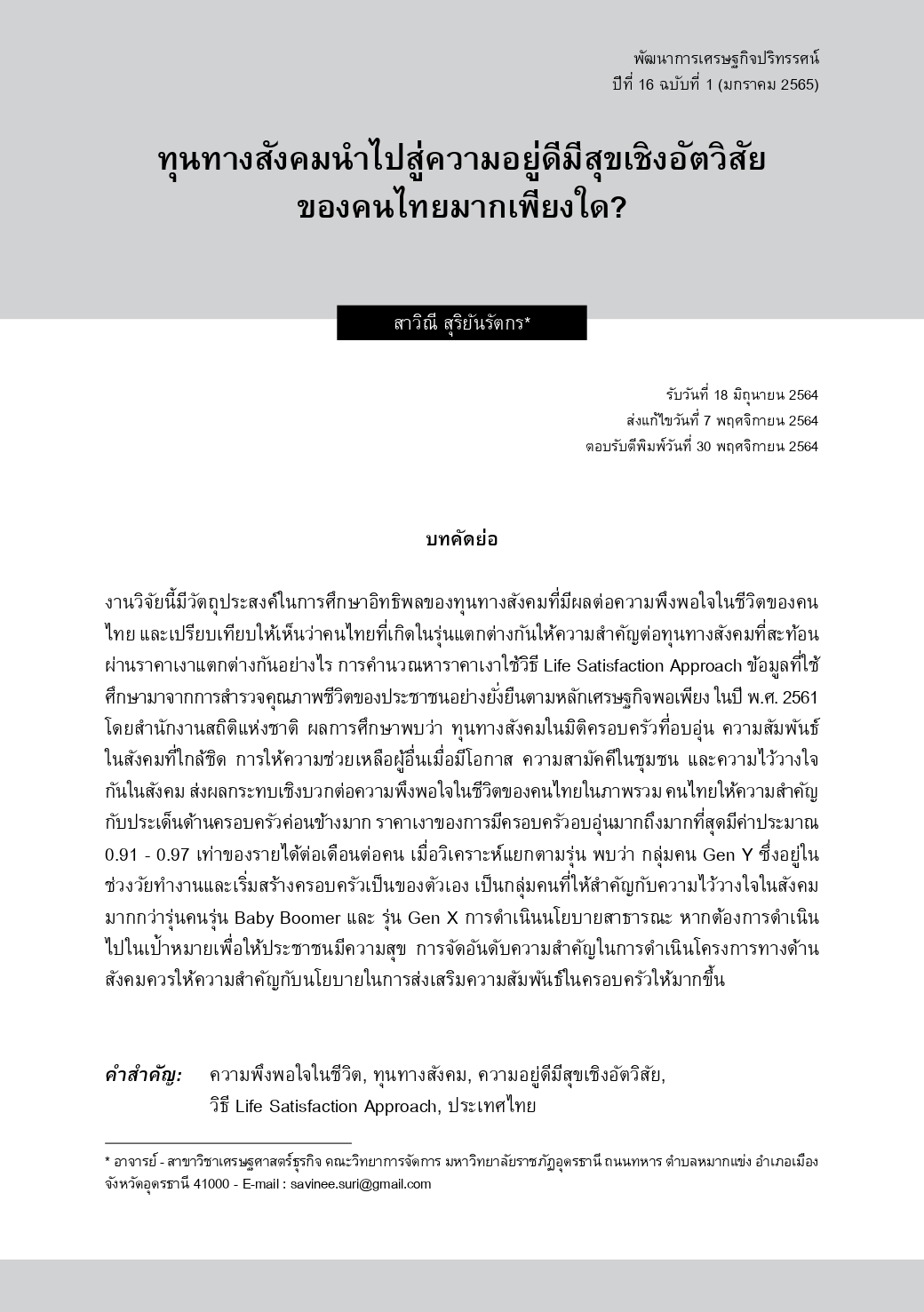ทุนทางสังคมนำไปสู่ความอยู่ดีมีสุขเชิงอัตวิสัยของคนไทยมากเพียงใด?
คำสำคัญ:
ความพึงพอใจในชีวิต, ทุนทางสังคม, ความอยู่ดีมีสุขเชิงอัตวิสัย, วิธี Life Satisfaction Approach, ประเทศไทยบทคัดย่อ
งานวิจัยนี้มีวัตถุประสงค์ในศึกษาอิทธิพลของทุนทางสังคมที่มีผลต่อความพึงพอใจในชีวิตของคนไทย และเปรียบเทียบให้เห็นว่าคนไทยที่เกิดในรุ่นแตกต่างกันให้ความสำคัญต่อทุนทางสังคมที่สะท้อนผ่านราคาเงาแตกต่างกันอย่างไร การคำนวณหาราคาเงาใช้วิธีวิธี Life Satisfaction Approach ข้อมูลที่ใช้ศึกษามาจากการสำรวจคุณภาพชีวิตของประชาชนอย่างยั่งยืนตามหลักเศรษฐกิจพอเพียง ในปี 2561 โดยสำนักงานสถิติแห่งชาติ ผลการศึกษาพบว่าทุนทางสังคม ในมิติครอบครัวที่อบอุ่น ความสัมพันธ์ในสังคมที่ใกล้ชิด การให้ความช่วยเหลือผู้อื่นเมื่อมีโอกาส ความสามัคคีในชุมชน และความไว้วางใจกันในสังคม ส่งผลกระทบเชิงบวกต่อความพึงพอใจในชีวิตของคนไทยในภาพรวม คนไทยให้ความสำคัญกับประเด็นด้านครอบครัวค่อนข้างมาก ราคาเงาของการมีครอบครัวอบอุ่นมากถึงมากที่สุดมีค่าประมาณ 0.91 - 0.97 เท่าของรายได้ต่อเดือนต่อคน เมื่อวิเคราะห์แยกตามรุ่น พบว่า กลุ่มคน Gen Y ซึ่งอยู่ในช่วงวัยทำงานและเริ่มสร้างครอบครัวเป็นของตัวเอง เป็นกลุ่มคนที่ให้สำคัญกับความไว้วางใจในสังคมมากกว่ารุ่นคนรุ่น Baby Boomer และ รุ่น Gen X การดำเนินนโยบายสาธารณะ หากต้องการดำเนินไปในเป้าหมายเพื่อให้ประชาชนมีความสุข การจัดอันดับความสำคัญในการดำเนินโครงการทางด้านสังคมควรให้ความสำคัญกับนโยบายในการส่งเสริมความสัมพันธ์ในครอบครัวให้มากขึ้น
เอกสารอ้างอิง
Ambrey, C. L., Fleming, C. M., & Chan, A. Y. C. (2014). Estimating the cost of air pollution in South East Queensland: An application of the life satisfaction non-market valuation approach. Ecological Economics, 97(C), 172-181.
Chandoevwit, W., & Thampanishvong, K. (2016). Valuing Social Relationships and Improved Health Condition Among the Thai Population. Journal of Happiness Studies, 17(5), 2167–2189.
Clark, A. E., Flèche, S., Layard, R., Powdthavee, N., & Ward, G. (2018). The Origins of Happiness:The Science of Well-Being over the Life Course. New Jersey: Princeton University Press.
Clark, A. E. (2018). Four Decades of the Economics of Happiness: Where Next?” Review of Income and Wealth. 64(2), 245–269.
Clark, A. E., Frijters, P. & Shields, M. A. (2008). Relative Income, Happiness, and Utility: An Explanation for the Easterlin Paradox and Other Puzzles. Journal of Economic Literature, 46(1), 95-144.
Growiec, K., & Growiec, J. (2013). Trusting Only Whom You Know, Knowing Only Whom You Trust: The Joint Impact of Social Capital and Trust on Happiness in CEE Countries. Journal of Happiness Studies, 15(5), 1015-1040.
Helliwell, J. F., & Putnam, R. D. (2004). The social context of well-being. Philosophical transactions of the Royal Society B Biological sciences, 359(1449), 1435-1446.
Helliwell, J. F., Huang, H., & Wang, S. (2016). New Evidence on Trust and Well-Being. NBER Working Paper 22450.
Helliwell, J., Layard, R., Sachs, J., & De Neve, J. (2020). World Happiness Report 2020. New York: Sustainable Development Solutions Network.
Kamp Dush, C. M. & Amato, P. R. (2005). Consequences of relationship status and quality for subjective well-being. Journal of Social and Personal Relationships, 22(5), 607-627.
Kim, A. C. H., Ryu, J., Lee, C., Kim, K. M., Heo, J. (2021). Sport Participation and Happiness Among Older Adults: A Mediating Role of Social Capital. Journal of Happiness Studies, 17(1), 1-11.
Knack, S. (2001). Trust, associational life and economic performance. In J. F. Helliwell & A. Bonikowska (Eds.), The contribution of human and social capital to sustained economic growth and well-being (172-202), Ottawa: Government of Canada.
Levinson, A. (2009). Valuing Public Goods Using Happiness Data: The Case of Air Quality. NBER Working Papers 15156, National Bureau of Economic Research, Inc.
Luechinger, S. (2009). Valuing Air Quality Using the Life Satisfaction Approach. The Economic Journal, 119(536). 482-515.
Maslow, A. (1943). A Theory of Human Motivation. Psychological Review, 50(4), 370-396.
OECD (2001). The Well-Being of Nations: The Role of Human and Social Capital. Paris: OECD Publications.
Park, K. (2020). Social Capital and Residential Satisfaction in South Korea: A Comparative Study of Communities in Seoul, Yeoju and Gwacheon. Environment and Urbanization Asia, 11(1), 140-154.
Peiró, A. (2006). Happiness, Satisfaction and Socio-Economic Conditions. The Journal of Socio-Economics, 35(2), 348–365
Powdthavee, N. (2008). Putting a price tag on friends, relatives, and neighbours: Using surveys of life satisfaction to value social relationships. Journal of Socio-Economics, 37(4), 1459-1480.
Prandini, R. (2014). Family Relations as Social Capital. Journal of Comparative Family Studies, 45(2), 221–234.
Rodríguez-Pose, A., & von Berlepsch, V. (2013). Social Capital and Individual Happiness in Europe. Journal of Happiness Studies, 15(2), 357-386.
Siedlecki, K, Salthouse, T., Oishi, S. & Jeswani, S. (2014). The Relationship Between Social Support and Subjective WellBeing Across Age. Social Indicators Research. 117(2), 561–576.
Stiglitz, J. & Sen, A. & Fitoussi, J. (2009). Report of the Commission on the Measurement of Economic Performance and Social Progress (CMEPSP).
Suriyanrattakorn, S. (2019). Happiness among the Disabled Elderly: A study based on micro data in Udonthani Thailand. Thammasat Economics Journal. 37(1), 83-91.
Tolsma, J., & Meer, T. W. G. (2017). Losing Wallets, Retaining Trust? The Relationship Between Ethnic Heterogeneity and Trusting Coethnic and Non-coethnic Neighbours and Non-neighbours to Return a Lost Wallet. Social Indicators Research, 131(2). 631–658.
Theurer, K., & Wister, A. (2010). Altruistic behaviour and social capital as predictors of well-being among older Canadians. Ageing & Society, 30(1), 157–181.
Thomas, P. A. (2010). Is it better to give or to receive? Social support and the well-being of older adults. The Journals of Gerontology: Series B Psychological Sciences and Social Sciences. 65B(3), 351– 357.
Thomas, P. A., Liu, H., & Umberson, D. (2017). Family Relationships and Well-Being. Innovation in aging, 1(3), 1-11.
Wike, R. (2008). Where Trust Is High, Crime and Corruption Are Low Pew. Retrieved from https://www.pewresearch.org/global/2008/04/15/where-trust-is-high-crime-and-corruption-are-low/.

ดาวน์โหลด
เผยแพร่แล้ว
ฉบับ
ประเภทบทความ
สัญญาอนุญาต
Copyright to published manuscripts becomes the property of the Graduate School of Development Economics, National Institute of Development Administration. Reproduction of all or part of a Development Economic Review (DER) article by anyone, excluding author(s), is prohibited, unless receiving our permission.

